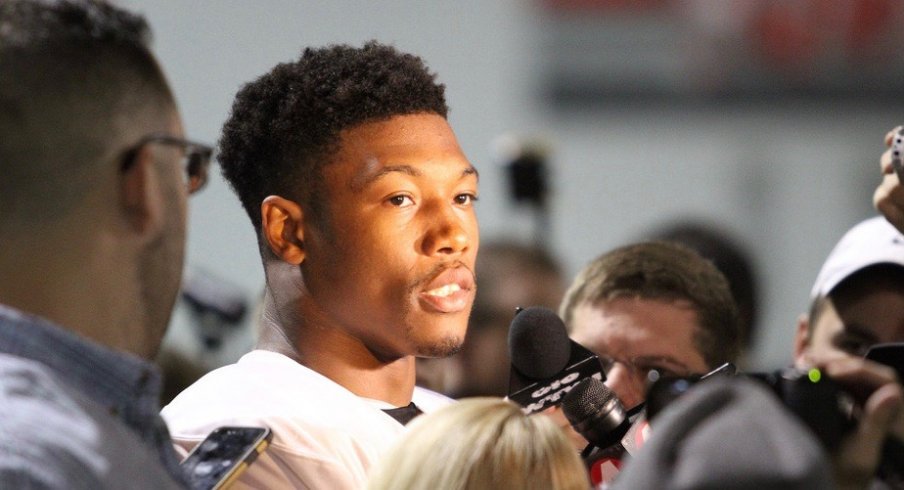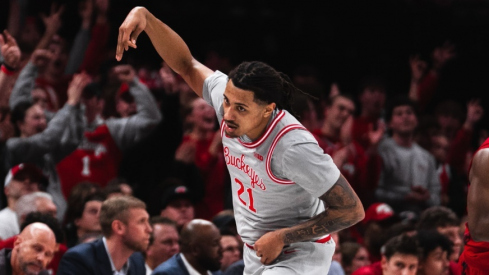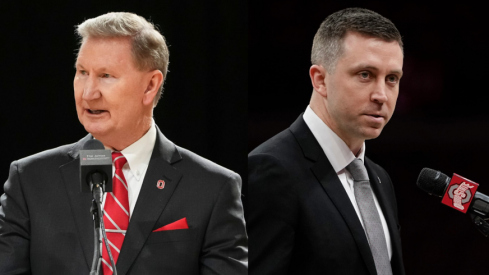The Ohio State University prides itself on the people, the tradition and the excellence of its athletics programs. Buckeye traditions and the excellence need no introduction. But how well do we know the people? Fans know players by the awe-inspiring feats they perform. Mask Off takes a closer look at those individuals as human beings.
Joshua Perry is the antithesis of a dumb jock. He is thoughtful, articulate and clearly takes time to read up on more than his playbook.
It is evident, though, that he is a product of thousands of hours of football. This becomes clear when he talks about "tackling" issues and fostering high "performance" in underserved communities.
He is a through and through linebacker in all facets of life. When he discusses social issues, you can perceive his mind's eye trying to cultivate awareness for the proverbial field of play. You can hear him reading situations with an ear toward whether he should drop into coverage by sponsoring a camp or dart into the fray of a heated debate.
Perry has consistently demonstrated an eagerness to take on issues beyond the gridiron. Whether he is raising awareness about autism, adding his voice to the Black Lives Matter movement or working with Jacob Jarvis to fight Duchenne muscular dystrophy, Perry is comfortable leading.
"He's one of my favorite guys," Urban Meyer said of Perry as a Buckeye captain. "He a guy that just does everything right, everything right."
Two seasons into his NFL career, Perry has not yet broken out as a star. As a human being, though, he is building momentum as he looks toward the future.
In his own words
What can you talk about for hours?
Oh man. Well, easily sports—football specifically. I could talk about that for days. But, when you get right down to it, anything that involves paying it forward. I can generally talk about that for a while. I can talk about social issues because they effect everybody. There’s a lot of great conversations to be had on topics of charitable giving and any type of social issues that are involved, so I usually find some pretty good conversation there.
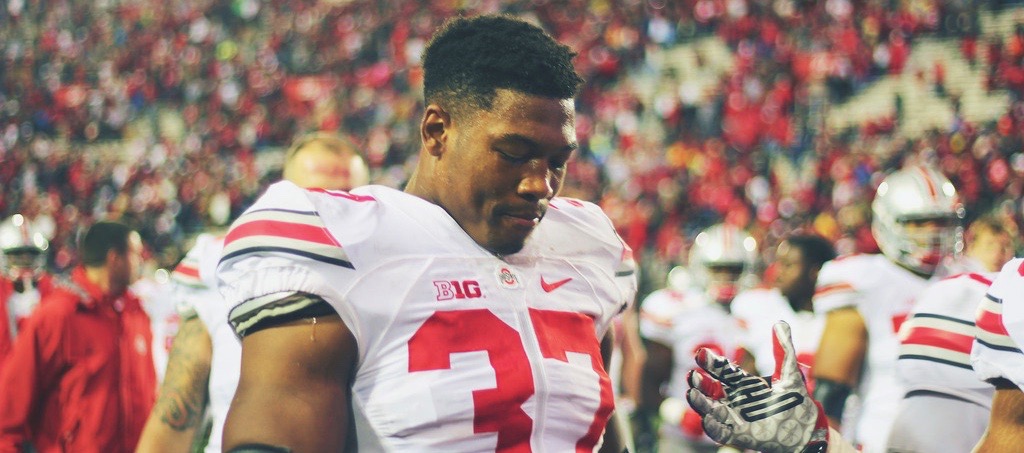
What are the issues that matter most to you?
Well, this football season we saw a lot going on with social injustice in terms of police brutality – you know – how disadvantaged people are treated. Moving forward to today, I was on twitter a little bit talking about gun laws and options there.
I know a lot of these issues that are tough to tackle. You’re not going to create a solution just through one conversation. But just being able to have open perspectives, just being able to have different peoples’ input who come from different walks of life and have different experiences – very unique experiences from day to day – I think just kind of helps clear the air a little bit and paves the way for some solutions.
ICYMI https://t.co/NFCRlWjKVH?amp=1
— Joshua E Perry (@RIP_JEP) October 19, 2017
What message do you have for young people on social issues or lessons you have learned over the years?
I think one of the biggest things is: see something, say something. So, if you see something going on that you don’t think is right, you should say something in that moment. A lot of times you’re able to curtail the problems that are happening.
And number two, most importantly, when something strikes you, and something is weighing on your heart, you need to act upon it. There are a bunch of different ways to do that. There are a lot of networks and different channels to be able to act upon those things that are weighing on you. But one of the worst things you can experience in terms of trying to right a wrong is when people are inactive – when they don’t take the opportunities that they have to try to try to make a difference.
Change and making a difference doesn’t have to be something huge. You don’t have to change the whole landscape. It can be something as easy as: if you see a kid getting bullied, you should say something to the bully. And then you should try to be a helping hand to the person who is being bullied. It can be something as simple as that, where you’re not changing the world doing it, but you’re making an impact on one person’s life.
Who is your biggest role model?
My father, for sure. I think he’s just a standup guy. As solid a human as they come. And he’s somebody that has always put other people before himself, and I have a lot of appreciation for that. He’s a very sharp person, very wise. Whenever I have an issue or something I want to talk about, he usually says the right thing to me. So, he has been really important in my development, not only when I was younger, but as I’m growing into a man who has all kinds of responsibilites and different things thrown at me all the time. He is so helpful.
What is something you learned at Ohio State that transfers to life outside of football?
Just what grinding really means. Just the dirty work, and how repetitive it can be sometimes. It’s getting up at 5am when you don’t really want to get up. And it’s doing things for yourself because you know nobody else is going to do it for you. And the team aspect of how you have to be able to rely on others, but others have to be able to rely on you.
All the experiences of being on a team, in a locker room with a bunch of people – the experiences you have playing a tough sport that requires a lot of you while balancing academics – I think has led me to understand that anything in life that you want to do isn’t going to be easy. But what you put in, you’re going to get out. Seeing the value in that has been huge.
What is your best memory from Ohio State?
It has got to be the National Championship year, specifically that three game run at the end of the season where we go in and beat Wisconsin, beat the brakes off of them. Then go into the Sugar Bowl, and that was probably one of the most memorable experiences, period. Being in a hostile territory, playing down south. We’re down at halftime, then we end up beating Alabama.
Then going in to the National Championship. Doing confetti angles on the field after the game, and literally picking up handfuls of the confetti, and taking them home with me because I knew that would be something I would cherish for the rest of my life. You made it to the pinnacle, and that is something you don’t do very often. That is something that will stand out in my mind forever.
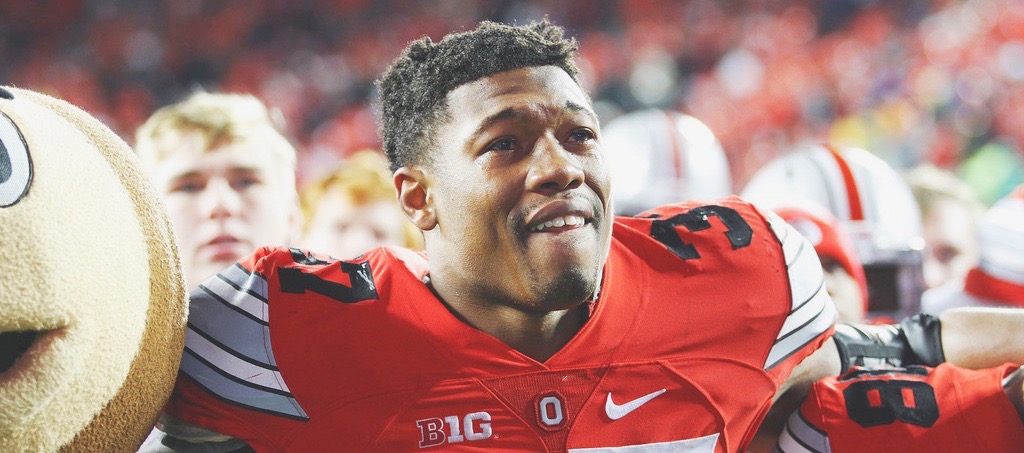
What did it feel like when you were going through that three-game stretch? Can you describe it?
It is pretty taxing, to be honest, because there is so much that goes into it physically, and your emotions are running so high. You know, we played that Big Ten Championship game, the week of the game, we learned about our teammate who had committed suicide. That was really emotional for us because he was the ultimate teammate – kind of a guy who really knew he wasn’t going to be on the field, but gave it his all every day. So adding that level of emotion is huge.
But you experience so much joy. You experience so much elation from being able to win big games like that. I think you create a bond, too. Some of my best friends right now are guys that I played with that were on that team because we knew exactly what we put in. And we knew nobody else was doing it with us. So the bond you forge there is something that lasts a long time.
What is your dream job after football?
I want to own an enterprise of sorts where I’m branching out to different businesses. I have an interest in real estate, and I want to get into that. I’m currently taking pre-licensing courses. From the residential sales part to the investment part, I want to be in. I want to own a sports facility of sorts. Kind of a multi-purpose type facility, but somewhere young people can train and develop.
I just started a charity, the Joshua Perry Family Foundation. I want to be very active in that, and be able to go into schools and make an impact on kids from kindergarten until eighth grade. And kind of be a bridge between what they receive in school and what they receive at home, and fill in those gaps there.
Our #2and7Day Reception was filled with some of our favorite people celebrating our mission to "Tackle Illiteracy"! pic.twitter.com/nh3FPKmQeN
— 2nd & 7 Foundation (@secondandseven) February 7, 2018
What kind of programming do you provide?
What we want to do are after school and mentorship type programs. We realize that there is a huge need for leaders, and a lot of times there are underprivileged young people who have great skill and immense talent, and they need guidance and help to develop all of that skill. A lot of times you see there are underprivileged young people who have a lot that they’re dealing with. When they go home, they don’t know if the lights are going to be on, if they’re going to have a meal. Sometimes their shoes and their shirts don’t fit. And that all effects their performance in the community, as well as at school.
We want to make a difference doing that. Our target is kindergarten through eighth grade. We’re putting on a camp this year at Olentangy Berlin High School. That’s the new one. And that’s going to be open – it’s a free camp – K through eight.
We just want to be positive people.
Outside of that, our foundation is going to do work raising money for Autism Speaks. My younger brother has autism, so we’ll do a fundraiser there every year. And then we want to do drives, like a supply drive for back-to-school, sock drive in the winter. Just, all around, being able to reach out to people who need our help.
